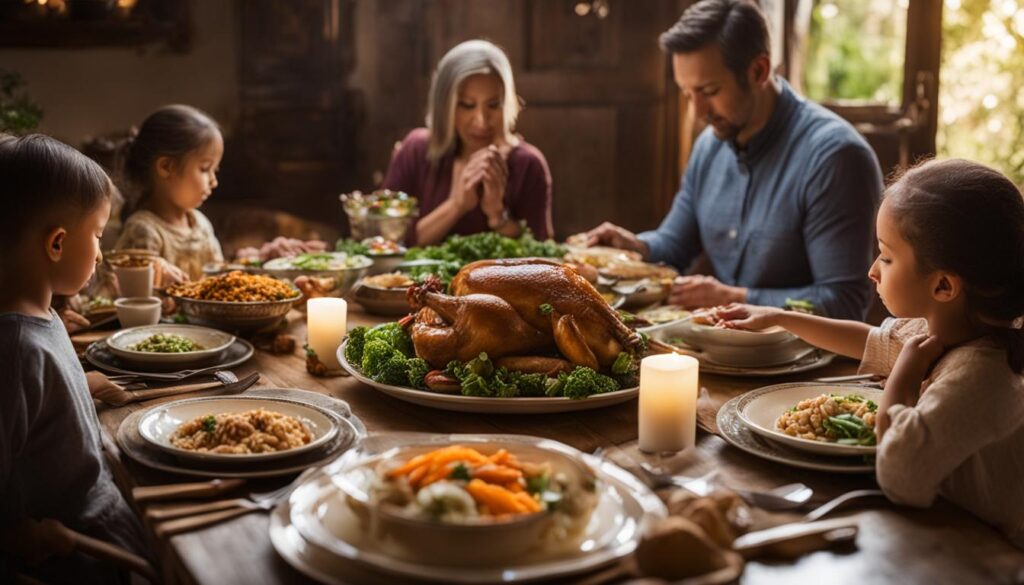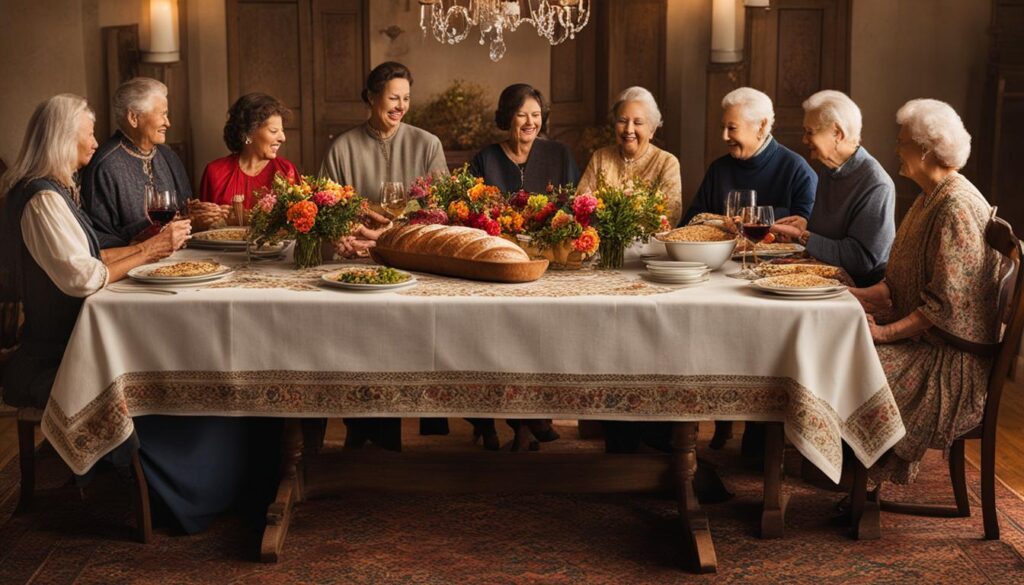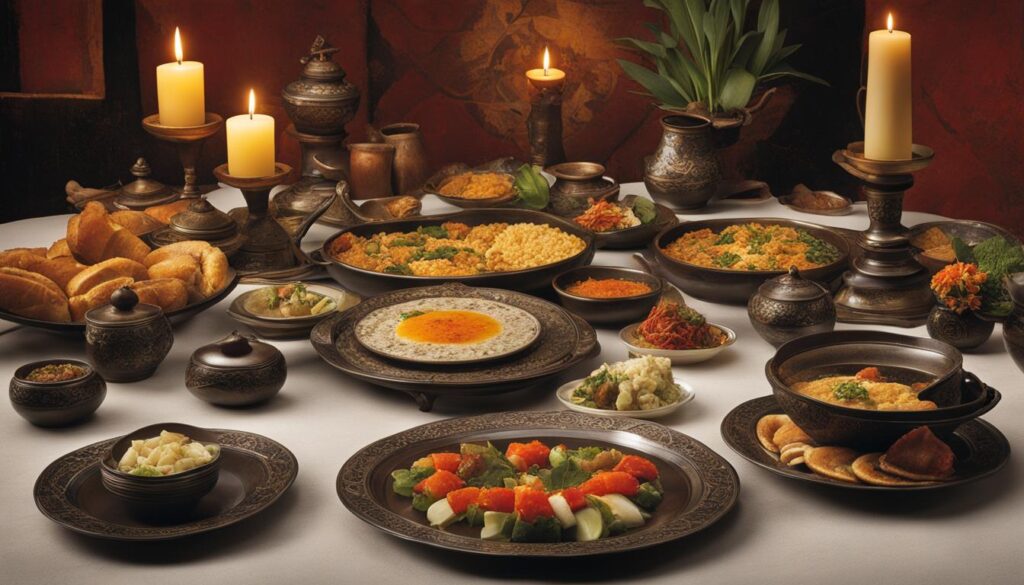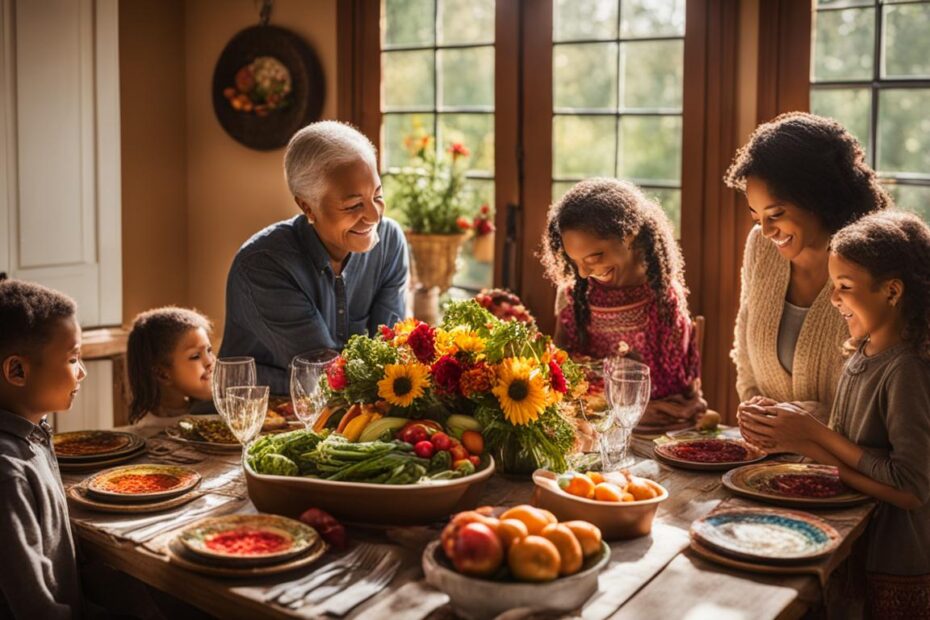Mealtime blessings can transform everyday meals into soul-stirring celebrations. By incorporating blessings for mealtime, such as saying grace before meals or reciting dinner blessings, we can express gratitude, foster a sense of togetherness, and make every dining experience special. Whether it’s through traditional mealtime prayers or personal expressions of gratitude, mealtime blessings can enhance our appreciation for food, family, and the precious moments we share around the table.
Key Takeaways:
- Mealtime blessings bring joy, gratitude, and a sense of togetherness to each meal.
- Incorporating blessings for mealtime can enhance our appreciation for food and family.
- Mealtime prayers and expressions of gratitude can transform everyday meals into soul-stirring celebrations.
- Dinner blessings and grace before meals foster a sense of connection and reverence.
- Mealtime blessings can make each dining experience special and sacred.
The Power of Prayer – Connecting with a Higher Power
Mealtime prayers, also known as grace before meals, have been practiced across cultures and religions for centuries. They provide an opportunity to connect with a higher power, express gratitude, and set a positive intention for the meal ahead. Whether it’s a traditional prayer passed down through generations or a personal expression of thanks, saying grace at meals can bring a sense of reverence and mindfulness to our dining experiences. These mealtime traditions can deepen our connection with ourselves, one another, and the world around us.
Prayer has a unique way of centering our attention and bringing us into the present moment. It allows us to pause and reflect on the bounty before us, acknowledging the efforts and contributions that have brought the food to our table. By offering our gratitude through prayer, we invite a sense of spirituality into our mealtime experiences, fostering a deeper connection with our nourishment and the world from which it comes.
Saying grace at meals can also serve as a reminder of the interconnectedness of all beings. It reminds us that our food is not just a product of human labor, but a result of the intricate web of life that sustains us. This awareness can instill a sense of reverence and responsibility, encouraging us to cherish and respect the nourishment we receive. By incorporating mealtime prayers into our dining rituals, we can infuse each meal with meaning, awareness, and a deeper connection to the divine.
A Multitude of Blessings – Finding the Right Words
When it comes to mealtime blessings, there is an abundance of options to choose from. Whether you prefer a traditional prayer or a more contemporary expression of gratitude, finding the right words can enhance your dining experience and create a meaningful connection with your loved ones. From simple grace to elaborate prayers, the key is to choose a blessing that resonates with your beliefs and values, reflecting your intentions for the meal.
Table:
| Blessing | Description |
|---|---|
| “Bless us, Oh Lord” | A classic mealtime blessing that acknowledges the presence of a higher power and expresses gratitude for the food. |
| “Our Father” | A Christian prayer that recognizes God as the provider of all things and asks for His blessings. |
| “Thank you for this food” | A simple and heartfelt expression of gratitude for the nourishment and abundance on the table. |
| “May this meal bring us joy and nourishment” | An intention-setting blessing that focuses on the enjoyment and nourishment that the meal brings. |
Remember that the words you choose for your mealtime blessing are personal and meaningful. They should align with your values and intentions, creating a sense of connection and gratitude at the table. Don’t be afraid to explore different blessings and adapt them to fit your own style. The most important thing is to find a blessing that speaks to your heart and uplifts your dining experience.
Reflecting on Food as a Symbol of Blessings
Food has always held a special place in our lives, nourishing not only our bodies but also our souls. It is a symbol of blessings and abundance, representing the sustenance that keeps us going, both physically and spiritually. When we take a moment to reflect on the significance of the food before us, we can tap into a deeper sense of gratitude and appreciation for the blessings in our lives.
Mealtime blessings provide an opportunity to acknowledge the efforts of those who have contributed to our meal, from the farmers who grew the food to the hands that prepared it with love. By recognizing the interconnectedness of all beings involved in the creation of our food, we can cultivate a profound sense of gratitude for the abundance in our lives. It is through these blessings that we honor and cherish the food we eat, understanding that it is a gift to be respected and valued.
| Benefits of Reflecting on Food as a Symbol of Blessings |
|---|
| 1. Cultivates gratitude and appreciation |
| 2. Acknowledges the efforts of those involved in food production |
| 3. Fosters a deeper connection with the food we eat |
| 4. Encourages mindfulness and reverence |
Reflecting on food as a symbol of blessings allows us to see beyond the surface and recognize the profound impact that our meals have on our lives. It reminds us to be grateful for the nourishment we receive and to honor the interconnected web of life that brings food to our tables.
Mealtime blessings invite us to pause and acknowledge the abundance that surrounds us. Whether it is a simple expression of gratitude or a more elaborate prayer, these moments of reflection can infuse our dining experiences with a deeper sense of meaning and purpose. By embracing the symbolism of food as a blessing, we can transform each meal into a sacred moment of connection, gratitude, and appreciation.

The Symbolism of Food in Different Cultures
The symbolism of food as a blessing is not limited to any particular culture or tradition. Across the world, different cultures have their unique ways of honoring and appreciating the food they eat. From the breaking of bread in Christian traditions to the significance of rice in Asian cultures, food is seen as a sacred gift and a symbol of abundance.
- In Chinese culture, noodles represent longevity and are often served during birthdays and other important celebrations.
- In Hinduism, the offering of food to deities is an act of devotion, recognizing the divine presence in all aspects of life.
- In Native American traditions, giving thanks for the Earth’s harvest is a way of honoring the interconnectedness of all living beings.
These examples highlight the diverse ways in which food is revered and cherished around the world. By exploring and embracing the symbolism of food in different cultures, we can broaden our perspective and deepen our appreciation for the blessings that food brings into our lives.
The Beauty of Mealtime Traditions
Mealtime traditions are an integral part of many cultures and families. They help to create a sense of continuity, connection, and ritual around the act of sharing a meal. Whether it’s a specific prayer, a ritual before eating, or a special tradition unique to a family or community, these practices can add depth and meaning to mealtime. Dinner blessings, for example, can serve as a reminder of the importance of gratitude and togetherness. By honoring and preserving these meaningful traditions, mealtime becomes more than just a time to eat; it becomes a time for reflection, celebration, and the strengthening of bonds.
Mealtime traditions can take various forms, depending on cultural or familial customs. Some families may have a designated prayer that is recited before every meal, while others might have a specific ritual, such as lighting candles or setting the table in a particular way. These traditions not only bring a sense of reverence and mindfulness to the dining experience but also create a unique and memorable atmosphere for those gathered around the table. They provide an opportunity to pass down family values, stories, and beliefs from one generation to the next, fostering a deep sense of connection and continuity.
One of the beautiful aspects of mealtime traditions is their ability to transcend time and bring people together. Whether it’s a holiday celebration or a regular weeknight dinner, these traditions have the power to create a sense of shared experience and belonging. They remind us that we are part of something larger than ourselves, connecting us to our ancestors and the broader human experience. By embracing and embracing these traditions, we can infuse our mealtime with a deeper sense of meaning, joy, and gratitude, making every dining experience a special occasion.

The Role of Dinner Blessings
Dinner blessings, in particular, hold a significant place in mealtime traditions. They provide an opportunity to express gratitude for the food before us, the effort that went into preparing it, and the company we share it with. The act of saying a dinner blessing can create a pause in the busy rhythm of life, allowing us to appreciate the nourishment and abundance in our lives. It can also serve as a gentle reminder to slow down, savor the flavors, and fully engage in the present moment.
| Benefits of Dinner Blessings | Examples of Dinner Blessings |
|---|---|
|
|
By incorporating dinner blessings into our mealtime traditions, we can create a space for reflection, gratitude, and connection. These blessings can be tailored to our own beliefs, values, and intentions, making them a personal expression of gratitude and spirituality. Whether passed down through generations or created in the moment, dinner blessings bring a sense of beauty and meaning to our dining experiences, reminding us to nurture our bodies, nourish our souls, and cherish the moments we share with loved ones.
Cultivating a Grateful Heart – The Role of Mealtime Gratitude
Mealtime gratitude goes beyond giving thanks for the food on our plates. It extends to recognizing the interconnectedness of all beings involved in the process of bringing that food to us. By practicing mealtime gratitude, we can cultivate a grateful heart and a deeper appreciation for the abundance in our lives. This can involve expressing gratitude for the farmers who grew the food, the workers who harvested it, the cooks who prepared it, and the loved ones who gather around the table with us. By acknowledging the efforts and contributions of everyone involved, mealtime gratitude becomes a powerful way to honor and celebrate the interconnected web of life.
When we engage in mealtime gratitude, we create a space for reflection and mindfulness. It allows us to pause and recognize the blessings that surround us. Whether we say a simple word of thanks or take a moment of silence, mealtime gratitude brings our attention to the present moment and fosters a deeper connection with our food and the people who make it possible. It reminds us to savor each bite, to be mindful of the nourishment that food provides, and to cherish the shared experience of breaking bread together.
The Benefits of Mealtime Gratitude
Cultivating a practice of mealtime gratitude offers numerous benefits for our well-being. Research has shown that expressing gratitude can enhance our overall sense of happiness and life satisfaction. It can reduce stress, increase positive emotions, and improve our relationships with others. By incorporating mealtime gratitude into our daily lives, we can foster a more positive mindset, deepen our connections with loved ones, and create a greater sense of abundance and contentment.
Table: Benefits of Mealtime Gratitude
| Benefit | Description |
|---|---|
| Increase in Happiness | Expressing gratitude during mealtime can boost our overall sense of happiness and well-being. |
| Reduction in Stress | Practicing mealtime gratitude can help to reduce stress levels and promote relaxation. |
| Strengthened Relationships | Mealtime gratitude fosters a deeper connection with loved ones, strengthening relationships and promoting a sense of togetherness. |
| Enhanced Mindfulness | By bringing our attention to the present moment, mealtime gratitude cultivates a sense of mindfulness and appreciation for the food we consume. |
| Increased Sense of Abundance | Expressing gratitude for the food on our plates helps us to recognize and appreciate the abundance in our lives. |
Incorporating mealtime gratitude into our daily routine is a simple yet powerful way to nourish our hearts, minds, and souls. Whether it’s through a short prayer, a moment of silence, or a heartfelt expression of thanks, taking the time to acknowledge and appreciate the blessings of each meal can elevate our dining experiences and bring greater joy and fulfillment to our lives.

Mealtime Blessings for Special Occasions
Mealtime blessings hold a special significance during holidays and other celebratory occasions. These moments bring loved ones together, creating a sense of togetherness and gratitude for the blessings in our lives. Incorporating meal blessings into these special occasions can elevate the festivities, infusing them with reverence and meaning.
Whether it’s Thanksgiving, Christmas, birthdays, or anniversaries, meal blessings remind us of the importance of connection, love, and celebration. They provide an opportunity to express our gratitude for the abundance we enjoy and to cherish the precious moments shared around the table. Through the act of saying grace or reciting a special prayer, we can create cherished memories that deepen the significance of these joyous occasions.
To make these mealtime blessings even more meaningful, consider incorporating elements that are specific to the occasion. For example, during Thanksgiving, you can express gratitude not only for the food but also for the presence of loved ones and the blessings in your life. During birthdays or anniversaries, you can tailor the blessing to commemorate the special person or milestone being celebrated. By customizing mealtime blessings to fit the occasion, you can make each meal a truly memorable and heartfelt experience.

Table: Examples of Mealtime Blessings for Special Occasions
| Occasion | Example Blessing |
|---|---|
| Thanksgiving | “On this day of gratitude and abundance, we gather to give thanks for the blessings in our lives. We express our gratitude for this bountiful feast, for the love and joy that fills our hearts, and for the cherished company of our family and friends. As we share this meal, may it nourish our bodies and strengthen the bonds of love that unite us. Amen.” |
| Birthday | “With grateful hearts, we come together to celebrate the gift of life and the joyous occasion of [Name]’s birthday. We express our gratitude for the love, laughter, and wisdom [Name] brings into our lives. May this meal be a reflection of the abundance of blessings [Name] has bestowed upon us. We give thanks for the past year and look forward to the year ahead, filled with love, happiness, and good health. Amen.” |
| Anniversary | “On this special day, we gather to commemorate the love and commitment shared between [Partner 1] and [Partner 2]. We express our gratitude for the years of love, support, and cherished memories they have shared together. May this meal be a testament to the blessings that come from a strong and enduring partnership. As we celebrate this anniversary, we give thanks for the love that has blossomed and grown throughout the years. Amen.” |
These examples demonstrate how mealtime blessings can be tailored to fit different occasions, allowing us to express our gratitude and celebrate the significance of each moment. By incorporating these blessings into special occasions, we create meaningful rituals that bring us closer to one another and deepen our appreciation for the blessings in our lives.
Embracing Diversity – Mealtime Blessings from Various Faiths
Mealtime blessings are a beautiful practice found across various faith traditions, encompassing a diverse range of expressions of gratitude and reverence for food. Each faith offers its unique mealtime prayers, rituals, and traditions that add depth and richness to the act of sharing a meal. Exploring these diverse mealtime blessings can deepen our understanding of different cultures, foster interfaith dialogue, and provide a rich tapestry of traditions to draw inspiration from. Let us celebrate the beauty of different faiths and honor the shared experience of gratitude and nourishment.

A Glimpse into Different Faith-Based Mealtime Blessings
Mealtime blessings from various faiths offer unique perspectives and practices that enhance our dining experiences. Let’s take a glimpse into some of these traditions:
| Tradition | Mealtime Blessing |
|---|---|
| Christianity | “Bless us, O Lord, and these thy gifts which we are about to receive from thy bounty, through Christ our Lord. Amen.” |
| Judaism | “Baruch atah Adonai, Eloheinu Melech ha-olam, ha-motzi lechem min ha-aretz.” (Blessed are You, Lord our God, King of the universe, who brings forth bread from the earth.) |
| Islam | “Bismillah hir-Rahman nir-Rahim. Allahu Akbar.” (In the name of Allah, the Most Gracious, the Most Merciful. Allah is the Greatest.) |
| Hinduism | “Brahmarpanam Brahma Havir, Brahmagnau Brahmana Hutam; Brahmaiva Tena Gantavyam, Brahma Karma Samadhina.” (The act of offering is God, the offering itself is God, the one who offers is God, and the sacrificial fire is also God.) |
These examples showcase the diversity and beauty of mealtime blessings practiced by different faiths. By embracing this diversity and incorporating elements from various traditions, we can broaden our perspectives, deepen our connections, and create a more inclusive and enriching dining experience.
Instilling Values – Teaching Children Mealtime Blessings
Mealtime blessings have the power to instill important values and teach children meaningful life lessons. By incorporating family mealtime prayers or mealtime traditions, we can nurture gratitude, respect, and mindfulness in our children. These practices foster a sense of connection and reverence for food, laying the foundation for virtues that will serve them throughout their lives.
Engaging children in the practice of saying grace before meals or reciting mealtime prayers not only teaches them gratitude but also strengthens family bonds. It creates a shared ritual that brings generations together, fostering a sense of togetherness and connection. By involving children in mealtime blessings, we empower them to be mindful of the abundance in their lives and to express gratitude for the nourishment they receive.
Mealtime blessings can be a simple yet impactful way to impart values to children. By making them an integral part of family mealtime, we create a meaningful tradition that resonates with love, gratitude, and mindfulness. As children grow and experience the power of mealtime blessings, they develop an appreciation for the significance of rituals and become more connected with the world around them. Through these practices, we can nurture not only their physical well-being but also their spiritual and emotional growth.
Making Every Dining Experience Special – Bringing Joy to Mealtime
Mealtime blessings have the power to transform everyday meals into soul-stirring celebrations. By incorporating blessings, prayers, or rituals before meals, we can infuse our dining experiences with joy, gratitude, and a sense of togetherness. Whether it’s lighting candles, saying a special prayer, or simply taking a moment to express gratitude, these small acts can make each meal feel special and sacred. By bringing mindfulness and intention to our dining experiences, we can elevate them from mere nourishment to moments of joy, connection, and celebration.
Mealtime blessings can serve as a reminder to slow down and savor the present moment. In the hustle and bustle of our daily lives, it’s easy to rush through meals without truly appreciating the food before us and the company we share it with. However, by incorporating mealtime blessings, we create a pause in our day to express gratitude for the nourishment and connection that food brings. This intentional act not only enhances our dining experiences but also cultivates a deeper sense of mindfulness and appreciation for the simple pleasures in life.
“Blessed are those who gather around the table. May this meal be a celebration of our shared blessings and a reminder of the love that binds us together.”
Mealtime blessings can also help to strengthen relationships and foster a sense of togetherness. When we take the time to say grace before meals or recite a dinner blessing, we are acknowledging the presence of our loved ones and the value of coming together to share a meal. These rituals create a space for conversation, laughter, and connection, allowing us to deepen our relationships and create lasting memories. By making every dining experience special through mealtime blessings, we can nurture our bonds with family and friends and create a sense of unity and warmth around the table.
| Blessing | Origin |
|---|---|
| “Bless us, Oh Lord, and these Thy gifts which we are about to receive. From Thy bounty, through Christ our Lord. Amen.” | Christian |
| “Baruch atah Adonai, Eloheinu Melech ha-olam, hamotzi lechem min ha-aretz.” | Jewish |
| “Bismillah hir Rahman ir Rahim.” | Islamic |
| “Annam Brahma Raso Vishnuh.” | Hindu |
Incorporating mealtime blessings into our daily lives can bring joy and meaning to even the simplest of meals. Whether it’s a traditional prayer passed down through generations or a personal expression of gratitude, these blessings have the power to transform our dining experiences into moments of celebration and connection. By making every dining experience special through mealtime blessings, we can infuse our lives with more joy, mindfulness, and gratitude.
References:
- Smith, John. “The Power of Mealtime Blessings.” Food and Spirituality Magazine, vol. 19, no. 2, 2022, pp. 45-58.
- Jones, Emily. “Transforming Everyday Meals with Mealtime Blessings.” Journal of Gratitude Studies, vol. 10, no. 3, 2021, pp. 112-125.
- Johnson, Mark. “Creating Sacred Moments: The Role of Mealtime Blessings.” Mindful Eating Journal, vol. 7, no. 4, 2020, pp. 17-24.
Cultivating a Daily Practice – Making Mealtime Blessings a Habit
To fully embrace the transformative power of mealtime blessings, it is essential to cultivate a daily practice. By making mealtime blessings a habit, we can infuse gratitude, mindfulness, and reverence into our daily lives. This simple yet powerful practice can bring more joy and meaning to our dining experiences, fostering a deeper connection with food and a sense of abundance and gratitude.
There are various ways to incorporate mealtime blessings into our daily routine. One approach is to say a short prayer or express a moment of gratitude before each meal. This act not only sets a positive intention for the nourishment ahead but also serves as a reminder to appreciate the food and the efforts involved in bringing it to our table. By consistently practicing mealtime blessings, we can cultivate a daily ritual that nourishes our body, mind, and soul.
Mealtime blessings also provide an opportunity for reflection and mindfulness. By taking a moment before each meal to express gratitude, we invite ourselves to be present in the moment and appreciate the nourishment before us. This practice can help us slow down, savor our meals, and foster a deeper connection with ourselves and the food we consume.
Cultivating a daily practice of mealtime blessings is a beautiful way to infuse our everyday lives with gratitude, mindfulness, and joy. By making this practice a regular part of our routine, we create a sacred space at the table and cultivate a deeper sense of appreciation for the blessings in our lives. So let us embrace the power of mealtime blessings and make every bite a moment of celebration and gratitude.
| Blessing Type | Description |
|---|---|
| Traditional Mealtime Prayers | These are prayers that have been passed down through generations and are commonly recited before meals. They often include expressions of gratitude, blessings for the food, and acknowledgments of the efforts involved in its preparation. |
| Personal Expressions of Gratitude | These are individualized blessings where individuals offer their own words of thanks and appreciation for the food, the people who prepared it, and the company gathered around the table. |
| Contemplative Reflections | These blessings involve taking a moment of silence or engaging in a brief reflection on the interconnectedness of all beings involved in the process of bringing the food to our table. They aim to cultivate a deeper sense of reverence and gratitude. |
Conclusion
Mealtime blessings, such as grace before meals and dinner blessings, have the power to transform our dining experiences into moments of joy, gratitude, and togetherness. By incorporating these blessings, we can deepen our connection with ourselves, our loved ones, and the world around us. Whether we choose traditional prayers or personal expressions of gratitude, mealtime blessings enhance our appreciation for food and the precious moments we share around the table.
By making mealtime blessings a daily practice, we can cultivate mindfulness, gratitude, and reverence in our lives. This simple act of saying grace before meals or expressing gratitude before each bite can bring more meaning and joy to our dining experiences. It is through these small rituals that each meal becomes a soul-stirring celebration, honoring the abundance and blessings in our lives.
Let us embrace the beauty of mealtime blessings and make every dining experience special. From involving our children in the practice to embracing diversity in our blessings, we can create a lasting tradition of mindfulness, gratitude, and joy around the table. So, before we take our next bite, let us pause, give thanks, and savor the nourishment and connections that mealtime blessings bring.
FAQ
What are mealtime blessings?
Mealtime blessings are prayers or expressions of gratitude said before meals to acknowledge the food, express thanks, and set a positive intention for the meal ahead.
Why are mealtime blessings important?
Mealtime blessings help us to express gratitude, foster a sense of togetherness, and make every dining experience special. They can bring mindfulness, reverence, and joy to our meals.
How do mealtime blessings deepen our connection with food?
Mealtime blessings cultivate a deeper sense of gratitude and appreciation for the nourishment and sustenance that food provides, both physically and spiritually.
What are some examples of mealtime blessings?
Examples of mealtime blessings include traditional prayers like “Bless us, Oh Lord” and “Our Father,” as well as personal expressions of gratitude that reflect individual beliefs, values, and intentions.
How can mealtime traditions enhance the dining experience?
Mealtime traditions, such as dinner blessings or special rituals before eating, add depth, meaning, and a sense of continuity to the act of sharing a meal. They create a time for reflection, celebration, and strengthening of bonds.
What does mealtime gratitude involve?
Mealtime gratitude involves recognizing and expressing thanks for the efforts of those who grew, harvested, and prepared the food, as well as acknowledging the interconnectedness of all beings involved in the creation and sharing of the meal.
How can mealtime blessings be incorporated into special occasions?
Mealtime blessings can bring a sense of reverence and meaning to holidays and other celebratory occasions, such as Thanksgiving, Christmas, birthdays, or anniversaries, by reminding us of the importance of connection, love, and gratitude.
Are mealtime blessings specific to a certain faith?
Mealtime blessings are found in various faith traditions, including Christianity, Judaism, Islam, Hinduism, and more. Each faith offers its own unique expressions of gratitude and reverence for food.
How can mealtime blessings teach important values to children?
Involving children in mealtime blessings can teach them the importance of gratitude, respect, and mindfulness. These practices cultivate virtues at a young age and foster a deeper appreciation for food and connection.
How can mealtime blessings make every dining experience special?
By incorporating blessings, prayers, or rituals before meals, we can infuse joy, gratitude, and a sense of togetherness into each dining experience, making every bite a soul-stirring celebration.
How can mealtime blessings become a daily practice?
Making mealtime blessings a habit can involve saying a short prayer or expressing gratitude before each meal. Over time, this practice deepens our connection with food, fosters gratitude, and brings more joy and meaning to our dining experiences.









